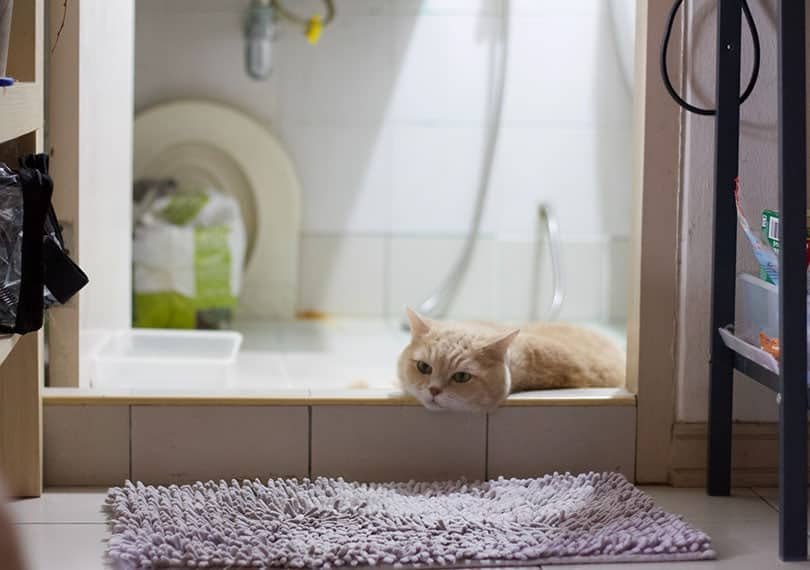Welcome to our “Ask Dr. Paola” series, where every Monday we bring you expert advice directly from Dr. Paola Cuevas (MVZ) to help our readers better understand the health and well-being of their cats.
Whether you are a new pet parent or an experienced cat lover, Dr. Paola here to answer your most pressing questions. From nutritional tips and preventative care to troubleshooting common behavioral problems, Dr. Paola is ready to offer insights that will keep your cat happy, healthy and felines fine. Stay tuned for expert guidance on a range of topics that matter most to you and your cat, so you can make informed decisions and provide the best possible care for your furry companion.
Do you have a question? Submit it here!


Help! My cat suffers from allergies!
“Dear Dr. Paola,
My 6-year-old cat Nikki suffers from allergies. We don’t know the exact allergen, but a change in litter, food and water has helped a little. She was badly traumatized as a kitten. Although she loves to be cuddled, any attempt to hold her to medicate causes a panic reaction. I’ve tried everything I can think of – mixing with food, liquid treats, applying to her fur – nothing works. Is there any new subdural medication that her vet can use?” – Linda
Hi Linda,
Caring for a cat with a history of trauma and allergies can definitely be challenging. It is important to work closely with a veterinarian to ensure that the treatment plan meets Nikki’s physical and emotional needs. Identifying allergy triggers is a key step as it allows for targeted strategies to effectively manage her signs.
Treatment options may include antihistamines for mild cases or as part of a broader plan, corticosteroids to reduce inflammation and itching, and immunotherapy to desensitize her to specific allergens over time. Other options, such as immunosuppressants such as Atopica (cyclosporine) or off-label use of Apoquel (oclacitinib), may also be considered, but this must be based on her specific case. Stress management is also important as it can significantly affect her overall well-being as stress worsens allergies.
If you would like to learn more and explore the different options available to Nikki while minimizing stress and ensuring her comfort, we recommend that you speak with one of our veterinarians in a one-on-one consultation at PangoVet.com. PangoVet’s services can provide personalized advice and help you navigate the next steps, ensuring that you and the vet can work together to create a plan tailored to her specific needs.
Best wishes!
Dr. Paola
💛 😺 Talk to a vet online from your couch!


If you need to talk to a vet but can’t get to one, go to PangoVet. It’s an online service where you can talk to a vet online and get the personal advice you need for your pet – all at an affordable price!




Help! My cats are farting machines!
“Dear Dr. Paola,
I have two 5 month old kittens, Tux and Max, from the SPCA. They eat Purina pro plan kitten food wet 2 times a day in addition to their dry food. Are they supposed to be little raging farting machines? I pick one up and WAM, it’s so gross I have to cover my nose. Is this normal? Thanks.” – Mary
Hey Mary! It’s not uncommon for kittens to occasionally experience gas, but persistent foul-smelling gas in their stomachs is not considered normal. There are several possible reasons for this. Dietary factors are often the primary cause. Highly processed foods may contain ingredients that some kittens have a harder time digesting, such as certain proteins, fillers or additives. Swallowing air while eating, especially if they are enthusiastic eaters, can also contribute to the problem. In addition, kittens recently adopted from shelters may have an imbalance in their gut flora or may still harbor intestinal parasites even though they were treated for worms.
I recommend starting by looking more closely at their diet. Switching to a species-appropriate, less processed food with fewer additives can help improve their digestion and reduce gas. You’ll want to stay away from foods with “Meat Byproducts” in the ingredients list, as you never know what they contain. Adding a high quality veterinary recommended probiotic can support them in building a healthy gut microbiome. It’s also a good idea to confirm with your vet that Tux and Max are free of intestinal parasites, as these can often cause gastrointestinal distress, including gas. If the problem persists or is accompanied by diarrhea, vomiting or weight changes, a veterinary visit will be essential to rule out other underlying concerns.
Kind regards
Dr. Paola




Help! My cat needs weekly baths!
“Dear Dr. Paola,
I have a foster cat, Catsby, with severe environmental and food allergies. As he is allergic to dust mites, he gets a weekly bath with a hypoallergenic shampoo. (Plus HEPA filters, frequent bed changes, steam mopping, etc.) Someone recommended monthly treatment with Revolution because it would help with any dust mites in the environment. Is it true? I hate putting chemicals on his skin unless they would really help significantly. Thank you Dr. Paola”
– Kitty
Hi Kitty,
Thank you for your dedication to Catsby’s care while he finds a forever home! While Revolution (selamectin) is effective against many parasites such as fleas, ear mites and sarcoptic mange mites, it does not work on dust mites. Dust mites, such as Dermatophagoides farinae and Dermatophagoides pteronyssinus, live in the environment and feed on household members’ skin flakes and other organic debris. Since they do not feed on or feed from pets, they are not exposed to selamectin, which primarily targets parasites that live in and interact directly with treated animals.
I must congratulate you, you are already doing an excellent job of managing Catsby’s house dust mite allergies with HEPA filters, frequent bed changes, steam mopping and hypoallergenic baths. These steps are the most effective in controlling dust mites and minimizing allergens. Adding Revolution is unlikely to provide additional help to dust mites, so I understand your reluctance to use chemicals unnecessarily. Never take treatment
This article is part of our weekly Ask Dr. Paola series

